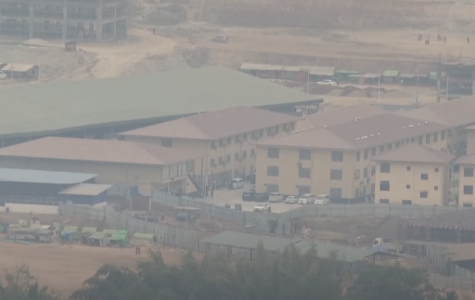Crackdowns aren’t enough: A global threat continues to grow
- Replies 0
In an age where the internet has become a cornerstone of daily life, a sinister underbelly has emerged, thriving in the shadows of our interconnected world.
We’re here to shed light on a disturbing truth that affects us all, especially those of us who have embraced technology later in life.
The global scam industry, a nefarious empire of deceit, is not only surviving crackdowns but is evolving at an alarming rate. This is a call to awareness for every one of us, as no one is immune to the risks it poses.
Hundreds of individuals stand in organized rows within the confines of a white-walled compound, separated by nationality and overseen by armed guards in fatigues.
In a video obtained by CNN, a voice calls out, "Do you want to go home?" The group raises their hands in unison, responding, "Yes."
These individuals are among approximately 7,000 people recently freed from scam centers operated by criminal syndicates and warlords along Myanmar's border with Thailand.
Many were held against their will and coerced into defrauding unsuspecting victims, including American citizens, of their life savings.
While some entered these compounds voluntarily, many others were deceived by promises of lucrative employment or other enticing prospects. Instead, they were trafficked across the border into Myanmar and forced to participate in fraudulent investment schemes and romance scams.
For years, these scam centers and cyber fraud compounds—many operated by Chinese crime syndicates—have flourished along the mountainous frontier, generating billions of dollars through scams, money laundering, and other illicit activities.

In response, the Chinese and Thai governments initiated a highly publicized crackdown in February. Despite the recent releases, these individuals represent only a fraction of the estimated 100,000 people trapped along the border.
Experts and analysts conveyed to CNN that the industry is poised for a resurgence.
"Billions of dollars are being invested in these kinds of businesses," noted Kannavee Suebsang, a Thai lawmaker spearheading efforts to liberate those held in scam centers. "They [the scam syndicates] will not stop."
Analysts describe the scam underworld as agile and professional, rapidly expanding cyber fraud operations through illicit online marketplaces to target new demographics.
These syndicates have swiftly adopted cryptocurrency and are investing in cutting-edge technological developments to expedite money transfers and enhance the effectiveness of their scams.
Criminal groups are utilizing artificial intelligence to craft scamming scripts and exploiting increasingly realistic deepfake technology to create personas, pose as love interests, and conceal their identity, voice, and gender.
"Fundamentally, this is a situation the region has never faced before," stated John Wojcik, an organized crime analyst at the United Nations Office of Drugs and Crime.
"It's clear that the evolving situation is trending towards something far more dangerous than scams alone—and rolling out at an unprecedented scale if left unchecked."
Evidence also suggests that Asian crime syndicates are expanding into other parts of the world, with networks identified in regions such as Africa, South Asia, the Gulf, and the Pacific, according to the UNODC.

"These syndicates are quickly maturing into more sophisticated cyber threat actors capable of deploying malware, deepfakes, and other powerful tools, fueled by the rise of new illicit online markets and crypto-based laundering services," Wojcik added.
The magnitude of the problem surpasses the capacity of any single government or agency to combat. Experts emphasize the necessity for a global response.
Scam City
The scam compounds in Myawaddy are situated in territories controlled by two Myanmar ethnic militia groups: the Karen Border Guard Force (BGF) and the Democratic Karen Benevolent Army (DKBA).
One notable complex is KK Park, a sprawling, purpose-built city dedicated to online gambling and cyber fraud.
Nestled among mountains and cornfields, this expansive, heavily guarded compound of multi-story buildings and telecom towers lies just inside Myanmar's border with Thailand—a conspicuous mark on an otherwise pristine landscape.
"They deceived many people, from South America, from North America, from Africa and Arabic-speaking countries," remarked Kannavee Suebsang, the Thai lawmaker.
Footage captured for CNN from within KK Park reveals paved roads lined with trees and manicured lawns, projecting the image of a legitimate business district, complete with a hotel and billboards advertising gambling sites.
However, inside what appears to be an office building, dozens of men are confined in a whitewashed room, sitting or lying on duvets on the floor.
In a nearby courtyard, numerous men and several women sit crouched in lines, most wearing masks to obscure their identities. Clothes and towels hang drying on overhead balconies.

The BGF militia had invited local journalists into KK Park on a heavily restricted visit. Armed BGF soldiers, carrying semi-automatic rifles and rocket-propelled grenade launchers, escorted the media through select buildings.
The several hundred individuals present are reportedly the recently released victims and workers of the scam compound, according to the BGF.
Chinese Pressure
The armed groups agreed to assist in halting illegal trafficking and scamming operations within their territories following pressure from Chinese and Thai authorities. This came after the high-profile abduction of a Chinese actor to a scam center in Myawaddy earlier this year.
These compounds have operated for years, shielded by the corruption and lawlessness pervasive in Myanmar's border regions.
However, criminal syndicates and the armed groups hosting them have exploited four years of devastating civil war to significantly expand their operations.
Since seizing power in a coup in February 2021, Myanmar's military junta has waged a brutal war against its people.
The military is engaged in multiple fronts against resistance groups and long-established ethnic minority armed forces, which the opposition government claims now control about 60% of the country.
More than $43 billion is lost to scams in Southeast Asia by regional crime groups annually—almost 40% of the combined gross domestic product of Laos, Cambodia, and Myanmar, according to the US Congress-founded United States Institute of Peace.
Previous crackdowns in Myanmar prompted the syndicates to relocate operations further into the country's interior or to major cities such as Yangon. Traffickers involved in bringing people into the centers have become more sophisticated, experts say.
Source: DW News / Youtube.
For years, these scam operations have thrived in Myanmar’s lawless border zones, aided by systemic corruption. The instability following the country’s 2021 military coup has only emboldened these criminal networks.
In the wake of the junta’s violent crackdown on opposition groups and ethnic minorities—who now reportedly control 60% of the country—these scam compounds have grown more entrenched.
The financial scale is staggering: organized crime in Southeast Asia is estimated to siphon off over $43 billion annually, nearly 40% of the GDP of Laos, Cambodia, and Myanmar combined, according to the United States Institute of Peace.
While some previous law enforcement efforts forced these groups to relocate deeper into Myanmar or urban centers like Yangon, experts say traffickers are now more sophisticated than ever. Even amid recent high-profile rescues, scam recruitment and operations continue to flourish.
“There are signs these operations are simply shifting to new hubs across the region,” warned John Wojcik of the UN Office on Drugs and Crime.
Although groups like the Border Guard Force (BGF) and local militias publicly portray themselves as helping shut down scam centers—going so far as to offer press tours—they’ve also been implicated in directly profiting from these activities.
According to analysts, the BGF played a key role in the rise of the criminal hub in Myawaddy starting in 2016, when it leased land to Chinese crime syndicates. After the 2021 coup, business boomed.
“The BGF has financial stakes in every one of these projects—it’s their primary source of revenue,” explained Jason Tower of the United States Institute of Peace. “They’re essentially aligned with criminal networks, using those funds to arm themselves and recruit more soldiers.”
Thai authorities have requested arrest warrants for BGF leader Saw Chit Thu—linked to the infamous Shwe Kokko compound—and two associates, accusing them of human trafficking. The case is under review.
Chit Thu, however, has publicly denied any involvement and claims the BGF is actively raiding these centers to eliminate them.
Source: CNA / Youtube.
China, traditionally a strong ally of Myanmar’s military, has taken a more aggressive stance against the border scam epidemic.
Analysts suggest Beijing may be using the crisis as an opportunity to expand its influence and security presence in Myanmar, particularly to monitor rebel movements near its frontier.
“They could use this growing footprint to collect intelligence and shape the direction of Myanmar’s civil conflict,” said Tower.
Meanwhile, officials from Myanmar’s information ministry said they are “actively investigating online scams and gambling,” and are cooperating with international partners.
But in the absence of a stable, unified government, experts remain skeptical that real progress can be achieved.
“As long as peace eludes Myanmar,” said Thai lawmaker Kannavee Suebsang, “this will remain the reality along the border.”
Efforts to dismantle the scam centers have also been disrupted by a recent catastrophic earthquake in central Sagaing, which claimed over 2,700 lives—further straining resources and complicating recovery efforts.
A Humanitarian Crisis in the Making
For the roughly 7,000 people recently freed from scam compounds, many face an uncertain path home. Armed groups in Myanmar are urging Thailand to allow their repatriation, claiming they lack the resources to care for them.
China has already flown thousands of its citizens back, and India recently repatriated over 500 nationals. But Thailand is now struggling to process a growing backlog of people from more than 20 countries.
“We’re teetering on the edge of a humanitarian crisis,” said Tower. “Managing such a diverse and widespread population of victims with little time or funding is a monumental task.”
Source: BBC News / Youtube.
In February, Kannavee successfully negotiated with the DKBA to rescue 260 individuals. Footage of their release showed people eagerly crossing the Moei River back into Thailand. While many appeared relieved, their ordeal was far from over.
“Many are still stuck in temporary shelters,” Kannavee added.
Families across Asia continue to anxiously await updates on loved ones still trapped. One such case is Chelsea, a woman from the Philippines whose husband left in April last year for what he believed was a tech support job in Thailand.
Pregnant at the time, Chelsea stayed behind.
Upon arriving in Bangkok, her husband was forcibly transported to Mae Sot, then trafficked into Myanmar by men armed with rifles.
Once inside the compound, Chelsea said, he was forced to work 17-hour days in online fraud without pay.
Former detainees and their families have shared harrowing details with CNN, saying workers who don’t meet quotas are routinely beaten, shocked with tasers, or imprisoned in isolation. Some are only freed after paying ransom or recruiting new victims.
CNN obtained disturbing footage from within a scam compound showing a man being tortured with electric shocks while he screams and begs for mercy.
“I can’t sleep at night,” said Chelsea. “I just keep thinking about what he’s going through.”
After briefly maintaining contact with her husband using a secondhand phone, Chelsea lost touch for three months.
Source: ABC News (Australia) / Youtube.
When he reappeared, he said the device had been discovered and he was threatened with being sold—possibly for his organs.
“They said if he was caught again, they’d take his kidney or eyes,” she said.
Recently, Chelsea’s husband was moved to a DKBA camp, where he waited for release. Last week, he finally made it out.
Other families are still waiting, gripped by fear. One woman in China said she suspected her sibling had been relocated to another compound in February.
Until the recent wave of releases, she had no news.
“Since February, surveillance has intensified—no one’s allowed to communicate,” she said. “I can’t imagine how terrible it must be inside.”
As we at The GrayVine reflect on this grim reality, we urge our readers to remain vigilant. Scammers often target older adults, exploiting their trust and sometimes limited experience with technology.
It's crucial to stay informed about the latest scams, to question too-good-to-be-true offers, and to protect personal information with the utmost care.

Have you or someone you know encountered a scam? What measures do you take to protect yourself online? Share your stories and tips in the comments below!
We’re here to shed light on a disturbing truth that affects us all, especially those of us who have embraced technology later in life.
The global scam industry, a nefarious empire of deceit, is not only surviving crackdowns but is evolving at an alarming rate. This is a call to awareness for every one of us, as no one is immune to the risks it poses.
Hundreds of individuals stand in organized rows within the confines of a white-walled compound, separated by nationality and overseen by armed guards in fatigues.
In a video obtained by CNN, a voice calls out, "Do you want to go home?" The group raises their hands in unison, responding, "Yes."
These individuals are among approximately 7,000 people recently freed from scam centers operated by criminal syndicates and warlords along Myanmar's border with Thailand.
Many were held against their will and coerced into defrauding unsuspecting victims, including American citizens, of their life savings.
While some entered these compounds voluntarily, many others were deceived by promises of lucrative employment or other enticing prospects. Instead, they were trafficked across the border into Myanmar and forced to participate in fraudulent investment schemes and romance scams.
For years, these scam centers and cyber fraud compounds—many operated by Chinese crime syndicates—have flourished along the mountainous frontier, generating billions of dollars through scams, money laundering, and other illicit activities.

A global scam industry is evolving at an unprecedented scale despite recent crackdowns, with thousands of individuals being held and forced to work in scam centers along the Myanmar-Thailand border. Image source: Al Jazeera English / Youtube.
In response, the Chinese and Thai governments initiated a highly publicized crackdown in February. Despite the recent releases, these individuals represent only a fraction of the estimated 100,000 people trapped along the border.
Experts and analysts conveyed to CNN that the industry is poised for a resurgence.
"Billions of dollars are being invested in these kinds of businesses," noted Kannavee Suebsang, a Thai lawmaker spearheading efforts to liberate those held in scam centers. "They [the scam syndicates] will not stop."
Analysts describe the scam underworld as agile and professional, rapidly expanding cyber fraud operations through illicit online marketplaces to target new demographics.
These syndicates have swiftly adopted cryptocurrency and are investing in cutting-edge technological developments to expedite money transfers and enhance the effectiveness of their scams.
Criminal groups are utilizing artificial intelligence to craft scamming scripts and exploiting increasingly realistic deepfake technology to create personas, pose as love interests, and conceal their identity, voice, and gender.
"Fundamentally, this is a situation the region has never faced before," stated John Wojcik, an organized crime analyst at the United Nations Office of Drugs and Crime.
"It's clear that the evolving situation is trending towards something far more dangerous than scams alone—and rolling out at an unprecedented scale if left unchecked."
Evidence also suggests that Asian crime syndicates are expanding into other parts of the world, with networks identified in regions such as Africa, South Asia, the Gulf, and the Pacific, according to the UNODC.

Criminal gangs and warlords, often run by Chinese crime syndicates, are conducting scams, money laundering, and other illicit activities. Image source: ABC News (Australia) / Youtube.
"These syndicates are quickly maturing into more sophisticated cyber threat actors capable of deploying malware, deepfakes, and other powerful tools, fueled by the rise of new illicit online markets and crypto-based laundering services," Wojcik added.
The magnitude of the problem surpasses the capacity of any single government or agency to combat. Experts emphasize the necessity for a global response.
Scam City
The scam compounds in Myawaddy are situated in territories controlled by two Myanmar ethnic militia groups: the Karen Border Guard Force (BGF) and the Democratic Karen Benevolent Army (DKBA).
One notable complex is KK Park, a sprawling, purpose-built city dedicated to online gambling and cyber fraud.
Nestled among mountains and cornfields, this expansive, heavily guarded compound of multi-story buildings and telecom towers lies just inside Myanmar's border with Thailand—a conspicuous mark on an otherwise pristine landscape.
"They deceived many people, from South America, from North America, from Africa and Arabic-speaking countries," remarked Kannavee Suebsang, the Thai lawmaker.
Footage captured for CNN from within KK Park reveals paved roads lined with trees and manicured lawns, projecting the image of a legitimate business district, complete with a hotel and billboards advertising gambling sites.
However, inside what appears to be an office building, dozens of men are confined in a whitewashed room, sitting or lying on duvets on the floor.
In a nearby courtyard, numerous men and several women sit crouched in lines, most wearing masks to obscure their identities. Clothes and towels hang drying on overhead balconies.

As a result of pressure from Chinese and Thai authorities, around 7,000 people were recently released from these scam centers, but experts believe this will only strengthen the scam industry as it adapts and continues to grow. Image source: ABC News (Australia) / Youtube.
The BGF militia had invited local journalists into KK Park on a heavily restricted visit. Armed BGF soldiers, carrying semi-automatic rifles and rocket-propelled grenade launchers, escorted the media through select buildings.
The several hundred individuals present are reportedly the recently released victims and workers of the scam compound, according to the BGF.
Chinese Pressure
The armed groups agreed to assist in halting illegal trafficking and scamming operations within their territories following pressure from Chinese and Thai authorities. This came after the high-profile abduction of a Chinese actor to a scam center in Myawaddy earlier this year.
These compounds have operated for years, shielded by the corruption and lawlessness pervasive in Myanmar's border regions.
However, criminal syndicates and the armed groups hosting them have exploited four years of devastating civil war to significantly expand their operations.
Since seizing power in a coup in February 2021, Myanmar's military junta has waged a brutal war against its people.
The military is engaged in multiple fronts against resistance groups and long-established ethnic minority armed forces, which the opposition government claims now control about 60% of the country.
More than $43 billion is lost to scams in Southeast Asia by regional crime groups annually—almost 40% of the combined gross domestic product of Laos, Cambodia, and Myanmar, according to the US Congress-founded United States Institute of Peace.
Previous crackdowns in Myanmar prompted the syndicates to relocate operations further into the country's interior or to major cities such as Yangon. Traffickers involved in bringing people into the centers have become more sophisticated, experts say.
Source: DW News / Youtube.
For years, these scam operations have thrived in Myanmar’s lawless border zones, aided by systemic corruption. The instability following the country’s 2021 military coup has only emboldened these criminal networks.
In the wake of the junta’s violent crackdown on opposition groups and ethnic minorities—who now reportedly control 60% of the country—these scam compounds have grown more entrenched.
The financial scale is staggering: organized crime in Southeast Asia is estimated to siphon off over $43 billion annually, nearly 40% of the GDP of Laos, Cambodia, and Myanmar combined, according to the United States Institute of Peace.
While some previous law enforcement efforts forced these groups to relocate deeper into Myanmar or urban centers like Yangon, experts say traffickers are now more sophisticated than ever. Even amid recent high-profile rescues, scam recruitment and operations continue to flourish.
“There are signs these operations are simply shifting to new hubs across the region,” warned John Wojcik of the UN Office on Drugs and Crime.
Although groups like the Border Guard Force (BGF) and local militias publicly portray themselves as helping shut down scam centers—going so far as to offer press tours—they’ve also been implicated in directly profiting from these activities.
According to analysts, the BGF played a key role in the rise of the criminal hub in Myawaddy starting in 2016, when it leased land to Chinese crime syndicates. After the 2021 coup, business boomed.
“The BGF has financial stakes in every one of these projects—it’s their primary source of revenue,” explained Jason Tower of the United States Institute of Peace. “They’re essentially aligned with criminal networks, using those funds to arm themselves and recruit more soldiers.”
Thai authorities have requested arrest warrants for BGF leader Saw Chit Thu—linked to the infamous Shwe Kokko compound—and two associates, accusing them of human trafficking. The case is under review.
Chit Thu, however, has publicly denied any involvement and claims the BGF is actively raiding these centers to eliminate them.
Source: CNA / Youtube.
China, traditionally a strong ally of Myanmar’s military, has taken a more aggressive stance against the border scam epidemic.
Analysts suggest Beijing may be using the crisis as an opportunity to expand its influence and security presence in Myanmar, particularly to monitor rebel movements near its frontier.
“They could use this growing footprint to collect intelligence and shape the direction of Myanmar’s civil conflict,” said Tower.
Meanwhile, officials from Myanmar’s information ministry said they are “actively investigating online scams and gambling,” and are cooperating with international partners.
But in the absence of a stable, unified government, experts remain skeptical that real progress can be achieved.
“As long as peace eludes Myanmar,” said Thai lawmaker Kannavee Suebsang, “this will remain the reality along the border.”
Efforts to dismantle the scam centers have also been disrupted by a recent catastrophic earthquake in central Sagaing, which claimed over 2,700 lives—further straining resources and complicating recovery efforts.
A Humanitarian Crisis in the Making
For the roughly 7,000 people recently freed from scam compounds, many face an uncertain path home. Armed groups in Myanmar are urging Thailand to allow their repatriation, claiming they lack the resources to care for them.
China has already flown thousands of its citizens back, and India recently repatriated over 500 nationals. But Thailand is now struggling to process a growing backlog of people from more than 20 countries.
“We’re teetering on the edge of a humanitarian crisis,” said Tower. “Managing such a diverse and widespread population of victims with little time or funding is a monumental task.”
Source: BBC News / Youtube.
In February, Kannavee successfully negotiated with the DKBA to rescue 260 individuals. Footage of their release showed people eagerly crossing the Moei River back into Thailand. While many appeared relieved, their ordeal was far from over.
“Many are still stuck in temporary shelters,” Kannavee added.
Families across Asia continue to anxiously await updates on loved ones still trapped. One such case is Chelsea, a woman from the Philippines whose husband left in April last year for what he believed was a tech support job in Thailand.
Pregnant at the time, Chelsea stayed behind.
Upon arriving in Bangkok, her husband was forcibly transported to Mae Sot, then trafficked into Myanmar by men armed with rifles.
Once inside the compound, Chelsea said, he was forced to work 17-hour days in online fraud without pay.
Former detainees and their families have shared harrowing details with CNN, saying workers who don’t meet quotas are routinely beaten, shocked with tasers, or imprisoned in isolation. Some are only freed after paying ransom or recruiting new victims.
CNN obtained disturbing footage from within a scam compound showing a man being tortured with electric shocks while he screams and begs for mercy.
“I can’t sleep at night,” said Chelsea. “I just keep thinking about what he’s going through.”
After briefly maintaining contact with her husband using a secondhand phone, Chelsea lost touch for three months.
Source: ABC News (Australia) / Youtube.
When he reappeared, he said the device had been discovered and he was threatened with being sold—possibly for his organs.
“They said if he was caught again, they’d take his kidney or eyes,” she said.
Recently, Chelsea’s husband was moved to a DKBA camp, where he waited for release. Last week, he finally made it out.
Other families are still waiting, gripped by fear. One woman in China said she suspected her sibling had been relocated to another compound in February.
Until the recent wave of releases, she had no news.
“Since February, surveillance has intensified—no one’s allowed to communicate,” she said. “I can’t imagine how terrible it must be inside.”
As we at The GrayVine reflect on this grim reality, we urge our readers to remain vigilant. Scammers often target older adults, exploiting their trust and sometimes limited experience with technology.
It's crucial to stay informed about the latest scams, to question too-good-to-be-true offers, and to protect personal information with the utmost care.
Key Takeaways
- A global scam industry is evolving at an unprecedented scale despite recent crackdowns, with thousands of individuals being held and forced to work in scam centers along the Myanmar-Thailand border.
- Criminal gangs and warlords, often run by Chinese crime syndicates, are conducting scams, money laundering, and other illicit activities, and have quickly adopted cryptocurrencies and advanced technologies like artificial intelligence and deepfake tech to enhance their operations.
- As a result of pressure from Chinese and Thai authorities, around 7,000 people were recently released from these scam centers, but experts believe this will only strengthen the scam industry as it adapts and continues to grow.
- The extent of the scam operations is so vast that experts and authorities stress the need for a global response to effectively combat and eradicate these fraudulent activities.
Have you or someone you know encountered a scam? What measures do you take to protect yourself online? Share your stories and tips in the comments below!






